John Cusack has spent decades now playing a stunningly diverse group of
characters
everything from romantic comedy to serious drama to the occasional
action film. In the process, he has appeared in some of the most
iconic films of the last few decades, including Say Anything, The
Sure Thing, Sixteen Candles, Bullets Over Broadway, High Fidelity, Stand
By Me, Better off Dead, Con Air, The Runaway Jury and even Hot Tub Time
Machine. However, it has been fairly rare that he has worked
in horror. Therefore, you know that when he does dip his toe in,
it will be for an interesting project.
Cusack's latest role is playing the literary giant
Edgar Allan Poe in The Raven, a spooky film which imagines the
writer's final days before his mysterious 1849 death. In the
movie, a madman starts killing people, mimicking methods described in
Poe's stories and poems. At first the police suspect the author,
but quickly they realize that Poe is probably the only one who can give
them insight into the madman's mind. Then when the killer kidnaps
Poe's one true love (Alice Eve), the deadly game takes on epic
proportions for the brilliant author.
We were recently lucky enough to be one of a few
media outlets to sit down with Cusack in the atmospheric Greenwich
Village pub The Vault at Pfaff's
which opened
only a few years after Poe's mysterious death
to discuss
the new film and the mysterious scribe who inspired it.
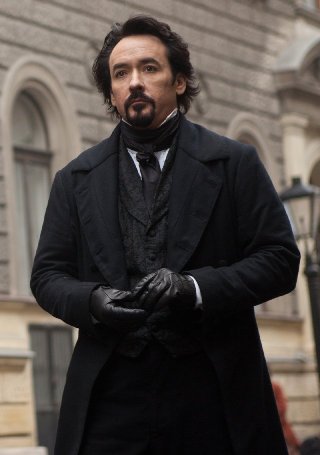 There
are so many different ways people perceive Edgar Allen Poe. What in the
script or your research did you find to portray him in this different
way?
There
are so many different ways people perceive Edgar Allen Poe. What in the
script or your research did you find to portray him in this different
way?
You can never do a
definitive version of somebody. Certainly not in one book or one movie
or one song. I don't think we've ever seen the writer Edgar Allen Poe.
We've seen "The Raven" or some of the stories. We've seen "The Pit and
the Pendulum" or "Fall of the House of Usher" or some of those types of
things. But what I read about him were his letters and his
biographies. There were some surprising things. The movie is a blend
of fact and fiction. The conceit of the movie, I think, is very
Poe-like in that it about Poe getting wrapped up in one of his own
stories. Becoming enmeshed in one of his own creations, which is sort
of thematic Poe. He was always trying to figure out the difference
between waking and dreaming, living and dying, sanity and insanity. He
was trying to get into that place beyond and look into that place. I
thought that allowed him to sort of deconstruct his own work, I guess,
in that way. Then you have all this stuff you can actually use, because
you know what he thinks about all of his stories. He wrote about his
stories. We know he'd thought about Wordsworth and Longfellow. We know
what he thought about other writers. We know how much he loved Virginia
and the way he lived for her. All these authority figures. We know
what he talked to his editors like. So we put them all into this
fantasy. It's a mix of real Poe and fantasy Poe. But so is Poe.
(laughs)
How much did you know of his work before getting involved
in the film?
I knew a lot about
it. I usually read about it in English class, and I don't know if you
really take anything [like that too seriously]. You dismiss it. Okay,
that's part of the curriculum. Then you want to go find the real stuff,
outside of school. I liked him. I liked anything to do with the
(long pause) other world. Anything that had a mystic quality to it,
or a supernatural, quasi-supernatural kind of feel. I always was
interested in that stuff. I loved Poe's work for that.
Poe did spend a lot of time writing things that were very
gory and very wild. Were there any stories or poems that you read that
aren't widely known that really moved you?
"Ululame." I
don't know if I'm saying it right. It was great. A great poem. All of
his poems are great. "The Raven" is a great poem. If you just look at
it, read it again, pay attention to the writing, wow! Great writer.
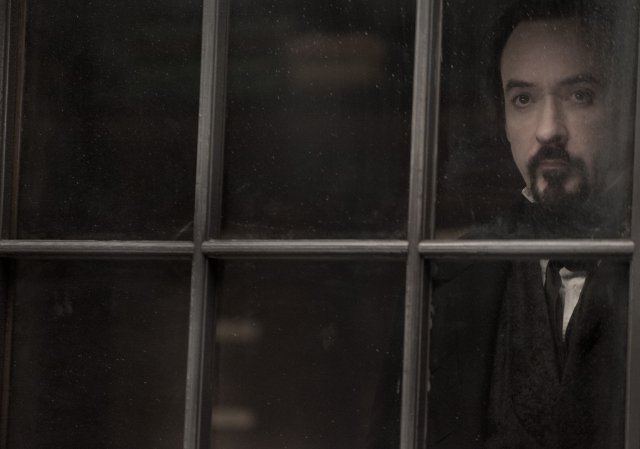 Which
elements of Poe's personality or life did you connect with, if any?
Which
elements of Poe's personality or life did you connect with, if any?
I think people can
connect to anybody who is outside the box. He was really brilliant and
almost sociopathic sometimes in his plights. He was at war with
everybody. He wanted to go against the grain.
Can you relate to that?
Actors, you don't
want to go with the herd. Why are we acting? We just want to prove
that we're different. Why do we all like Kurt Cobain? He was miserable
and depressed and he was anxious. He wanted to just leave. He didn't
want to be a part of society. He wanted to be on his own. But he was
like a patron saint. He didn't want the houses and all that stuff that
we all have and we relate to it, when we're not pretending to be
perfect. Poe was like the patron saint of the artistic and the doomed.
There's something great about that.
What about his romantic side?
Oh, doomed women.
He fell in love with doomed, dying women. His mother, his step-mother
and his wife all died of tuberculosis. They were all kind of fragile,
physically. He loved beauty and he loved women. I don't think he was a
playboy. I don't think he was out screwing around on his wife or
anything. He just loved. He wanted rich people to... he wanted patrons
more than lovers, I think. He wanted the Gertrude Stein of the day. He
wanted the rich people to pay for him and stuff. The intellectuals, he
wanted admirers as much or more than sex, really. Of course he was
romantic in that I think actually he loved his wife. The women he
loved, he loved a lot. Their purity. Men, he was competitive with.
Well-read. Taking on the establishment.
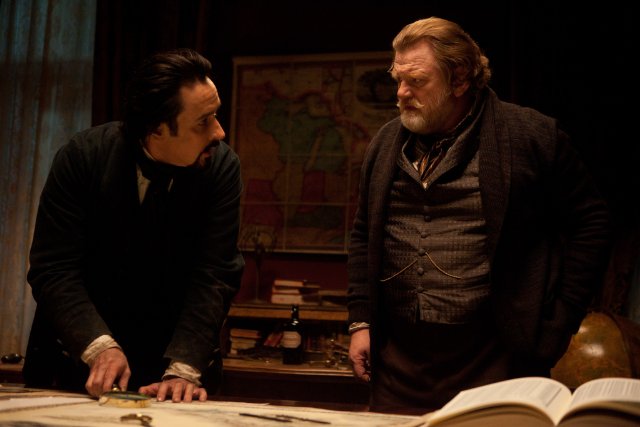 One
of the main establishment characters in the movie was played by Brendan
Gleeson. What was he like to work with?
One
of the main establishment characters in the movie was played by Brendan
Gleeson. What was he like to work with?
So good. So
good. All the actors were so good in it. So great. I was a huge fan
of his.
Another need
as a producer of this film you can probably relate to this
was Poe's need to get money, and the things he had to do to get it.
Totally. Of
course it is. If you read his letters, in most of them he's always
saying that he's in desperate circumstances and he needed some money.
He was scrounging for money his whole life. Literally, saying he's
going to just eat a dandelion salad. Food, drink, basic necessities, he
was always on the verge of ruin. And he was world-famous. He wrote
"The Raven." It's because there were no copyrights. He wrote "The
Raven" and it went all over the world. It got to Europe.
He actually got invited to the White House. He was a well-known poet
and intellectual. It's just nobody could really make a living as a
writer. If you tried to make a living as a writer, you'd do the stories
in the paper or you'd do a poem or write the horror stories. They were
very successful, but he got probably paid by the word, one time around,
and that was it.
He spent a lot of time in bars, too...
Yeah. I think he
was kind of a binge alcoholic, from what I've read in many sources.
He'd stop for a while to write, he'd get it together. Then something
would happen and he'd be off.
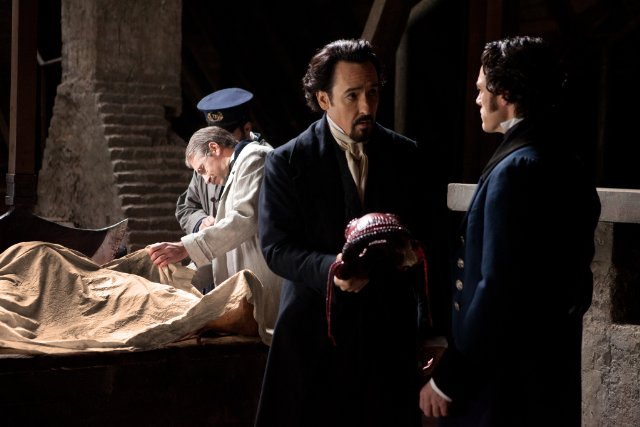 If Poe were still alive today, what questions would you ask
him?
If Poe were still alive today, what questions would you ask
him?
I don't know if
I'd ask him anything, because it's all there in the writing. And I
don't think you'd probably get a straight answer if you did. It would
be dependant on where you met him. If you met him on his first cocktail
or if you met him when he was hung over. Who knows where you'd get
him? He seemed to be by all accounts pretty mercurial. He could be
overcome by the needs. He was very passionate and didn't have a lot of
control over his emotions. Things got the better of him. Sometimes he
could be very polite and a real gentleman. Then something would happen,
the other guy would come over him and all of the sudden he'd be furious
about something.
Would you say he's the most damaged character you've ever played?
Aaaaaaah.
(long pause) Yeah. Yeah. Probably.
What kind of challenges did that present?
Well, he was a
genius. Most people aren't really geniuses. You'd better have an
insight. He had a pretty serious appetite for self-destruction, for
sure. I think it was also the romance of the abyss. There are not many
people who have had the worst nightmare you can think of. Most people
would then say, "Wake up, wake up, wake up." He was like, "Oh, great,
go in deeper." There are not many people like that. Poe, William
Burroughs and Hunter Thompson. There are people that do that, but there
are not that many people that can do that. Who want to go to try
to find the romance of the abyss, or the attraction to destruction.
He's the godfather of Goth, for sure. And the detective genre. He
started satire, science fiction. He [inspired] Jules Verne. He was the
first person to be called the imp of the perverse. He needed to do the
exact wrong, perverse thing. He was pretty out there.
Poe was a very complex character. What
was the process to come up with that and then to recover?
Just go all in and
submerse yourself in it. Then try to find your way out. I
knew I got to finish it, so it was either go goth or go home. He was a mixture of things, too. He wasn't just sober. He was
kind of funny and witty. His mind was real clear at times.
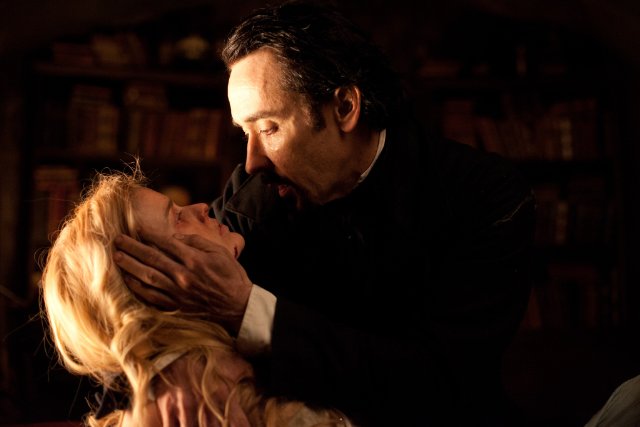 What
was the most surprising thing that you learned about Poe while doing
research on him?
What
was the most surprising thing that you learned about Poe while doing
research on him?
I'd forgotten that
he actually invented [all those styles of writing]... you can see the seeds of his influence in so
many different places. In so many different genres. Music and
cultural. Literature. You can see what began with the origins of him.
It branches out into so many different directions. I had forgotten
that. When you look into it, you can really sense it. He created
forensics and the detective genre, before Sherlock Holmes. Sir Arthur
Conan Doyle based Sherlock Holmes on Inspector Dupin in "Murders In The
Rue Morgue." He did parodies. Not parodies, but he did hoaxes,
journalistic hoaxes where he would do these stories that didn't happen.
Based on these balloons that would go into outer space. It was sort of
like a War of the Worlds
thing. He would put them out there. They were punks, pranks and super
science fiction-y. Then Jules Verne kind of got up on that and did that
a little bit. He would do satires, burlesques of other people's writing
styles. Obviously, he started the horror genre, the gothic horror
genre. He did other styles, too. He did these first-person
confessional things about the beast in him, which hadn't been done. And
romance. He made a romantic version of destruction. He would talk
about death and beauty. And he was completely brazen, coming like that
from a whole tradition of writers where they would tell the whole world
that they're the best and they were better than anyone else. He would
destructively put it all out there. His courage, he would say that he
couldn't believe in a God, because his whole being revolted to the idea
that there was anything in the universe superior to himself. And he
said that in print, when it was really difficult to print things. (laughs)
Really? It's not like an off-hand remark. It was an idea he just
put out there. He was crazy. He was so provocative and nuts.
People take Poe very seriously. What do you think people are going to
think of Poe the action hero?
I think they'll
probably like it. Some of them, maybe not. I don't know. Roger Corman
certainly took the burlesque satiric side of him and turned it into
these camp movies in the 60s. This takes his terror much more
seriously than those, certainly, but there is a element of burlesque and
vaudeville and mashing up genres and mind fucking that goes into Poe's
things. There could be a straight biopic that could be a good version
of this, too, but I thought this was a very good film...
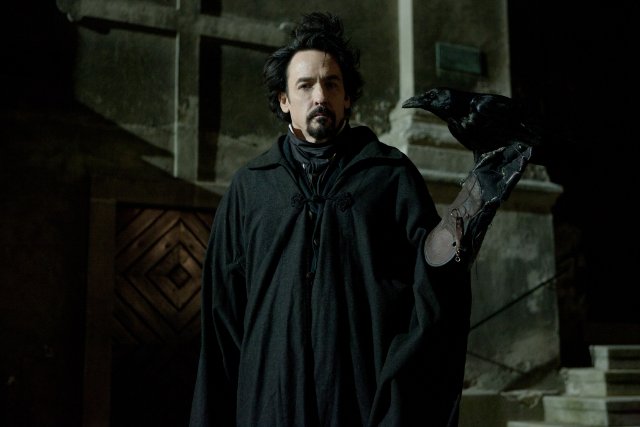 Since
this is a fictional look at the last days of a real person, how much did
you have to tread the line to not go too far from the truth but still
make it an interesting story?
Since
this is a fictional look at the last days of a real person, how much did
you have to tread the line to not go too far from the truth but still
make it an interesting story?
I don't think
you're really bound by it. This is a dream about Poe. It's based on what
his stuff feels like and what what he wrote feels like. Lou Reed made The
Raven [a musical based on the poem] and he just started re-writing
the poem. He was inspired by what Poe wrote. This was our best version
of a dream about Poe. Other people can make theirs, too.
What story were you most looking forward to seeing on the big screen?
"The Pit and the
Pendulum," I thought. I said that's hard core. [Poe] would be laughing
about Saw. He'd
say, "I'll show
you Saw." I always like the mystical side of his work. I love
the undead and the people that target death. I like supernatural Poe.
I like "Fall of the House of Usher," "The Masque of the Red Death,"
"Hop-Frog," "The Imp of the Perverse." I like those things. That's my
sweet spot.
Has this inspired you to make any future supernatural
films?
I did. I made Stephen King's 1408. I really
liked that. I got into [Twilight Zone creator] Rod Serling,
[who is like] a direct descendant of
Poe. I'd imagine Stephen King would feel a great allegiance to Poe. I've done
others. Identity was one that had sort of a meta vibe, too.